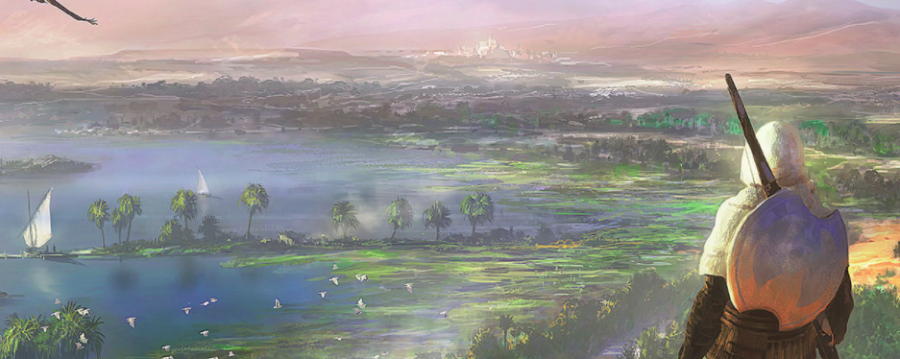Ubisoft Makes Improvements With Assassin’s Creed Origins
About two years back, game corporation Ubisoft announced that their biggest money maker, the Assassin’s Creed franchise, would be taking one year off to improve. This is quite surprising as AC previously had a yearly release schedule..
Why would a leviathan publisher such as Ubisoft go out of their way to make like a beaver and build a dam on their biggest revenue stream?
It was likely that the company wanted to improve its reputation, and it’s evident in other actions as well. Recently, innovative titles like Tom Clancy’s Rainbow Six Siege and For Honor have not only both been released in a functioning state, but also supported after launch with new content and fixes.
This is from a company with a history of churning out games that felt mechanical and unfinished, with many bugs and glitches as well. I guess you could say consumers spoke in unity (heh heh) against Ubisoft’s irresponsible business practices, and now we have Assassin’s Creed Origins.
Set in the New Kingdom of Egypt at 47 BCE, this game portrays the series’ origin story. Despite being set in ancient times, it’s not as primitive as one might think.
Unlike previous entries, AC Origins has new progression, combat, weapons and exploration systems.
The story is simple in premise. The player takes on the role of Bayek, a Medjay warrior, protector of the Pharaoh and the people. Think of it like being a Sheriff, or a Jedi. Bayek is also one of the last Medjay.
His goal is to get revenge on The Order Of The Ancients. This organization controls the Egypt behind the scenes, using the Pharaohs as puppets. Think of them as the Illuminati of Egypt. Hey, Egypt is the nation that built the pyramids! Coincidence? Yes, probably.
I digress. He wants to get revenge because the Order killed his son. I won’t go too deep here, to avoid spoilers, but the themes of this story explore revenge and its consequences. Overall, I found it quite entertaining.
A game can have revolutionary storytelling, but it all falls flat if the gameplay is bad.
Let me get down to the basics.
First of all, the player character is able to climb on nearly anything. While doing this requires no finesse, it empowers the player with a strong sense of freedom.
Players looking to accomplish their goals using stealth can use the parkour feature to hide over ledges, escape guards rounding the corner, or sneak up on a target.
Players looking to accomplish their goals using stealth can use the parkour feature to hide over ledges, escape guards rounding corners, or to sneak up on a target.
Players who are feeling a bit more artistic–say, paint the enemy stronghold red artistic–can use this feature to gain vantage points or make a hasty retreat. Be careful, though, because the enemies have good pathfinding skills and will try to get up there to kill you.
I’ll touch on AI in a bit, but first let’s look at the two playstyles I just described.
Stealth is a staple of all Assassin’s Creed games, and it’s always been pretty simple in previous AC games. Players have access to hiding places, which conceal them from enemies. It doesn’t matter how obvious you may look crouching in that six-inch high grass patch, they will not see you.
Hiding places have also been a good place to stash the bodies of guards you may have killed, lest they be found, alerting live ones of your presence. However, different hiding places have different pros and cons. The aforementioned grass (including bushes) allow the player to move freely concealed as far as the flora reaches.
Something unique to Origins is that you can’t conceal bodies in plants. Other hiding places work, but they have their own weaknesses. Some extra features include tools and distractions. Players can use fire to draw attention away from themselves, whether by throwing torches or by using flaming arrows.
Some bases may have lions locked in cages, which can be released as fluffy, toothy and chaotic distractions. Finally, players can also unlock darts that can put guards to sleep or make them go “berserk” and attack their fellow warriors.
One new direction in Assassin’s Creed Origins is that players are almost never restricted to stealth-only missions, as in previous AC games.
Occasionally the player will be plopped into a situation where they must fight their way out, but usually it allows this freedom.
The new combat system provides quick and heavy attacks, parries and dodging. All of these tactics can be used to enact gratifying combos. This compliments the game’s new weapon variety. There are swords, heavy blunts, spears, scepters and more. These weapons come in different tiers and attributes as well. It all comes together with ACO’s diverse cast of foes.
Stealth AI is standard. Guards patrol the base, you can whistle to lure them into your killing claws, they notice when their buddy gets killed and will light a brazier to call in reinforcements if necessary. Success comes from observing patterns and playing slowly.
One thing that seems new to me is that guards don’t always guard. Sometimes they’re sleeping, using the bathroom or talking to a friend. This rewards patience in stealth, allowing the player to catch an enemy at a weak moment.
While stealth AI may be basic, combat AI is astounding. Enemies will try to corner you and attack you sequentially. If you’re attacking a resource convoy, the escorts will try and cover the carrier as he gets away, giving you greater challenge when trying to snatch a resource like money or metal.
Enemies that advance towards you may rotate out the soldier on the front line with a healthier one if he gets injured via your defense. This provides a very fun combat loop that I recommend be played on hard mode for the best challenge.
The Assassin’s Creed franchise has always been known for having lots to do, when you’re not doing the main line of story based missions. I’m happy to say that it’s no different here.
Players can explore old temples, civilian locations, and military outposts for treasure. Tombs have even more treasure, and ancient stone tablets that offer even more reward. These tombs even include the pyramids, because there’s no better way to get some extra coinage while giving archaeologists of the future a hard time.
Stealth is a staple of all Assassin’s Creed games, and it’s always been pretty simple in previous AC games. Players have access to hiding places, which conceal them from enemies. It doesn’t matter how obvious you may look crouching in that six-inch high grass patch, they will not see you.
Besides this, there are side missions. Each one has its own voice acting, and a simple independent storyline. Sometimes these stories connect to the crisis of the main story, reflect on racial tensions or the main character Bayek himself. Another fun activity is papyrus puzzles, essentially pirate treasure maps in the form of riddles that can offer some rare gear.
Finally, there’s avenge quests. If another player dies somewhere during their playthrough, you can find their corpse lying in the corresponding location of your game world and then hunt down the NPC’s responsible. To put it shortly, the best way to experience Assassin’s Creed Origins is to stop and smell the roses now and again.
Although I use a base xbox one, arguably one of the worst pre-built machines on the market, the visuals are still stunning. I’ll never forget trekking through the sands of the Sahara, the shine of my shield and the galloping of my camel.
It’s wondrous to look at the winding pale yellow dunes meeting the deep blue sky just at the horizon. Soon, the bright glaring sun sets on said horizon, tragically swallowed by the night sky. Not too tragic, however, as it is bound to be reborn back in the east.
Aesthetically speaking, animations are also of high quality. For example, the aforementioned camel might as well be a product of Ubisoft’s secret Matrix for camels, because thinking that it a real one trapped in the game is outright perplexing. Let’s just hope one of them doesn’t turn on the player and do some slow motion gymnastics.
The special effects aren’t very remarkable, except for one I really like. The player character is covered in blood as a result of battle, and it’s quite dynamic as it seems to correlate with the fight itself. Additionally, fighting while on your mount will also cause it to be covered in blood.
I’ll never forget trekking through the sands of the Sahara, the shine of my shield and the galloping of my camel.
The game’s performance is adequate. It successfully maintains a stable thirty frames per second, sure, but hardware hell awaits you. Riding through big cities like Alexandria can emit some serious issues. Sometimes the game freezes. I think it crashed but it didn’t. I have gotten actual crashes though, about two so far, both of which were in Alexandria.
I am not aware of its performance on other consoles or PCs, so take that with a grain of salt. Besides that, I have found a few bugs. There was one where the blacksmith just ignored me. I couldn’t talk or trade with him, so I restarted my game.
Late game also allows you to fight war elephants, probably the buggiest enemy in the game. In a cinematic moment, I was on a chariot being chased by an elephant, but the elephant was completely invisible. Once the chariot reached a certain point, this happened. (Warning: Minor spoilers in this game clip )
Another annoyance in this game’s lack of polish is glitches in the dialog engine. Occasionally, a character will speak in a cutscene, but their voice will be completely silent. It even happened during a key moment in the story, ruining a major twist and leaving me to infer what happened in the following, well-functioning cutscenes.
I suggest waiting a month or two for the glitches to be patched out. If you’re impatient and can deal with the bugs, then feel free to do so. None of them are game-breaking, but they do destroy the level of immersion.
There are AI problems as well, but I’ve only encountered them when being stealthy. For example, I was sneaking around at an enemy base when I decided to release a nearby caged lion to distract the guards. The guards noticed the lion, but only for a few seconds before turning away.
Then the lion killed a horse just ten meters away, and all of sudden one of them walked up to its carcass and said something along the lines of “Hmm, stay sharp, somebody must’ve snuck in and assassinated our horse!”
There was also this one time where I tried luring a guard into my deadly talons with whistles, but every time he became suspicious of the sound, he near instantly lost interest.
You would think attention spans would be shorter now with our cell phones and television, not back then when the only pastimes were working and being oppressed.
To conclude, Assassin’s Creed Origins is a good game, not a great game, as its lack of polish holds it back. I give it an 88/100.
I suggest waiting a month or two for the glitches to be patched out. If you’re impatient and can deal with the bugs, then feel free to do so. None of them are game-breaking, but they do destroy the level of immersion.
If Ubisoft keeps heading in this direction, then the Assassin’s Creed franchise will become known as a quality game series, with each new entry introducing new innovation and fun.

Joey began writing for the Beachcomber in 2017. He covers movie and game reviews. In addition to writing for the Beachcomber, he plays video games.














![Jonah [Eli Boskey] is a math teacher and recovering gambling addict who is persuaded to enter a high-stakes game of yaniv with Bernstein [Ben Ducoff].](https://bcomber.org/wp-content/uploads/2024/01/Screen-Shot-2024-01-11-at-3.17.55-PM-1-600x359.png)



